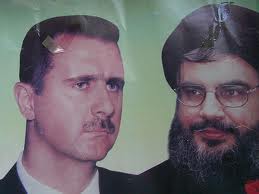 TWO years ago, times were good for Hezbollah, the Lebanese Shiite militia-cum-party with strong links to Iran and Syria. The group had risen from humble origins fighting Israeli soldiers in Lebanon in the 1980s to becoming a well-armed force that dominated the government. After holding its own in a brief 2006 war with Israel, the group’s appeal expanded beyond Lebanon’s Shiites to include many of the region’s Sunnis, who make up the bulk of the opposition to President Bashar Assad in neighbouring Syria.
TWO years ago, times were good for Hezbollah, the Lebanese Shiite militia-cum-party with strong links to Iran and Syria. The group had risen from humble origins fighting Israeli soldiers in Lebanon in the 1980s to becoming a well-armed force that dominated the government. After holding its own in a brief 2006 war with Israel, the group’s appeal expanded beyond Lebanon’s Shiites to include many of the region’s Sunnis, who make up the bulk of the opposition to President Bashar Assad in neighbouring Syria.
Today the group is in a more precarious position thanks to its backing for Mr Assad. Western officials have long said Hezbollah members are advising Mr Assad’s regime (America regards it as a terror group and is pushing the EU to label it similarly). A number of its members, including a senior commander, Ali Hussein Nassif, have been killed in Syria. But in recent weeks the group appears to have expanded its operations. Along the Syrian border with Lebanon, which has never been properly demarcated, Hezbollah men patrol Shiite villages. Anti-Assad fighters accuse Hezbollah of shelling Syria from the Lebanese town of Hermel in co-ordination with the Syrian army. They also report fighting against its men at the border close to Qusayr, a town in the central Homs province.
This is increasing tensions in fractious Lebanon. Its population is bitterly divided over the war in Syria, causing Hezbollah’s popularity to plummet. Having experienced their own 15-year civil war, most Lebanese fear being dragged into Syria’s conflict. Mr Assad’s regime is dominated by the minority Alawite sect (an esoteric offshoot of Shiite Islam) and suppresses the Sunni majority. This sits uneasily with Hezbollah’s usual championing of the oppressed. (Hamas, the Palestinian Islamist movement, has come out decisively against Mr Assad.)
Hezbollah’s astute leadership probably realises the cost of its involvement. It may not have sent as many men to Syria as it could have done. Its leader, Hassan Nasrallah, has called on Mr Assad to enact reforms and urged Lebanese to accept Syrian refugees. Some reckon Hezbollah is in Syria not just to help the regime. “They will be preparing for all eventualities,” says Augustus Richard Norton, a professor at Boston University who has written a book on the group. He thinks Hezbollah is also scouting for potential allies and sourcing weapons. Nonetheless, the threat to the group posed by the potential demise of the Assad regime, which acted as its arms conduit with Iran, puts Hezbollah in a bind.
Time

Leave a Reply
You must be logged in to post a comment.